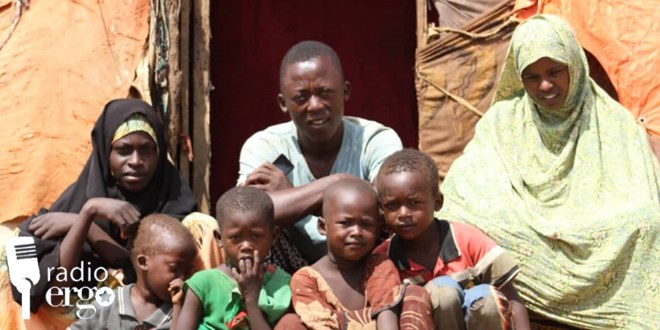
Wednesday April 3, 2024

Dinsor farmer, Mohamed Adan with his two wives and children in Weel Muge IDP camp in Baidoa/Abdullahi Mohamed/Ergo
Destitute families and those living in internal displacement camps in Baidoa have been struggling to find meals following steep rise in food prices since January. Earlier flooding of the river Shabelle cut off roads that normally are the supply routes to Baidoa from Mogadishu.
The prices of basic food items including flour, rice, sugar, pasta and cooking have doubled since the floods hit.
Mohamed Barakow Abdi, 45, a father of four children, said his family struggles to get just one meal a day. He is a porter making about two dollars a day – roughly the price of two kilograms of rice or flour.
“A kilo of rice is $1.5 and I earn just $2!” he said. “The rising food prices he really hurt us. We used to manage breakfast and lunch but now we eat once and it’s not enough for us and the children. We are in the month of Ramadan and we don’t have food in store.”
At the beginning of Ramadan, he took $50 worth of food on credit from a local store, although it didn’t last long.
“I can’t afford anything. Every day businessmen remind me to pay my debts and I don’t have the money to pay them. I sometimes get work and sometimes I don’t, whenever I don’t get a job I have to borrow money.”
Mohamed said locally grown food including maize, beans and sorghum had also risen in price due to cycles of drought and floods.
“There is nothing being harvested from the farms now, a kilo of beans is $1 and it was $0.4 a month ago, sorghum is $0.5 and was previously $0.2. It’s the same with the maize. Everything has risen sky high,” he complained.
Mohamed himself used to be a farmer in Bakal village, 25 kilometres from Baidoa, where his three-hectare farm failed in 2022 following prolonged drought and lack of rainfall. He constructed a two-room shack where they are living now in Baidoa, although they haven’t moved in to a camp.
His children are all out of school as he can’t afford to pay their fees.
Meanwhile, Mohamed Adan Hilowle, 33, lives with his two wives and five children in Weel Muge IDP camp in Baidoa. It’s on privately owned land so they always worry about being evicted.
Without a job or any source of income, his family depends on their neighbours for food although everyone in the camp has similar struggles.
“We don’t have food, we depend on a quarter kilo that we might get from someone, and half from someone else. That’s how we survive, we don’t get breakfast or lunch we only get dinner. If there are people in a desperate situation it is us!” he said.
He was laid off from the $4 a day work he had in a quarry that closed down in December.
“A person can only work hard, only God can change or alleviate our suffering. We hope that the aid organisations can help us,” he appealed.
Residents in the IDP camp have to pay 20,000 Somali shillings ($0.8) for 20 litres of water. Mohamed has to beg for money to get his family water.
In better days, Mohamed was also a farmer in Dinsor, where their four-hectare farm failed due to water shortage. They abandoned the land in March 2022 to join the IDP camp, hoping to get aid and opportunities.
Baidoa residents depend on food imported by road from Mogadishu, 245 kilometres away.
Ibrahim Osman Adan, a businessman in Baidoa, told Radio Ergo that the trucks used to take a day to cover the distance that now takes two and a half days. Drivers have to take longer alternative routes due to flood damage. The extra costs of transportation have been passed on to the consumers.
“People used to buy what they needed but now they can’t afford it, which causes a problem for us as well. I used to make a good income, but nowadays people can’t afford our goods,” he said.